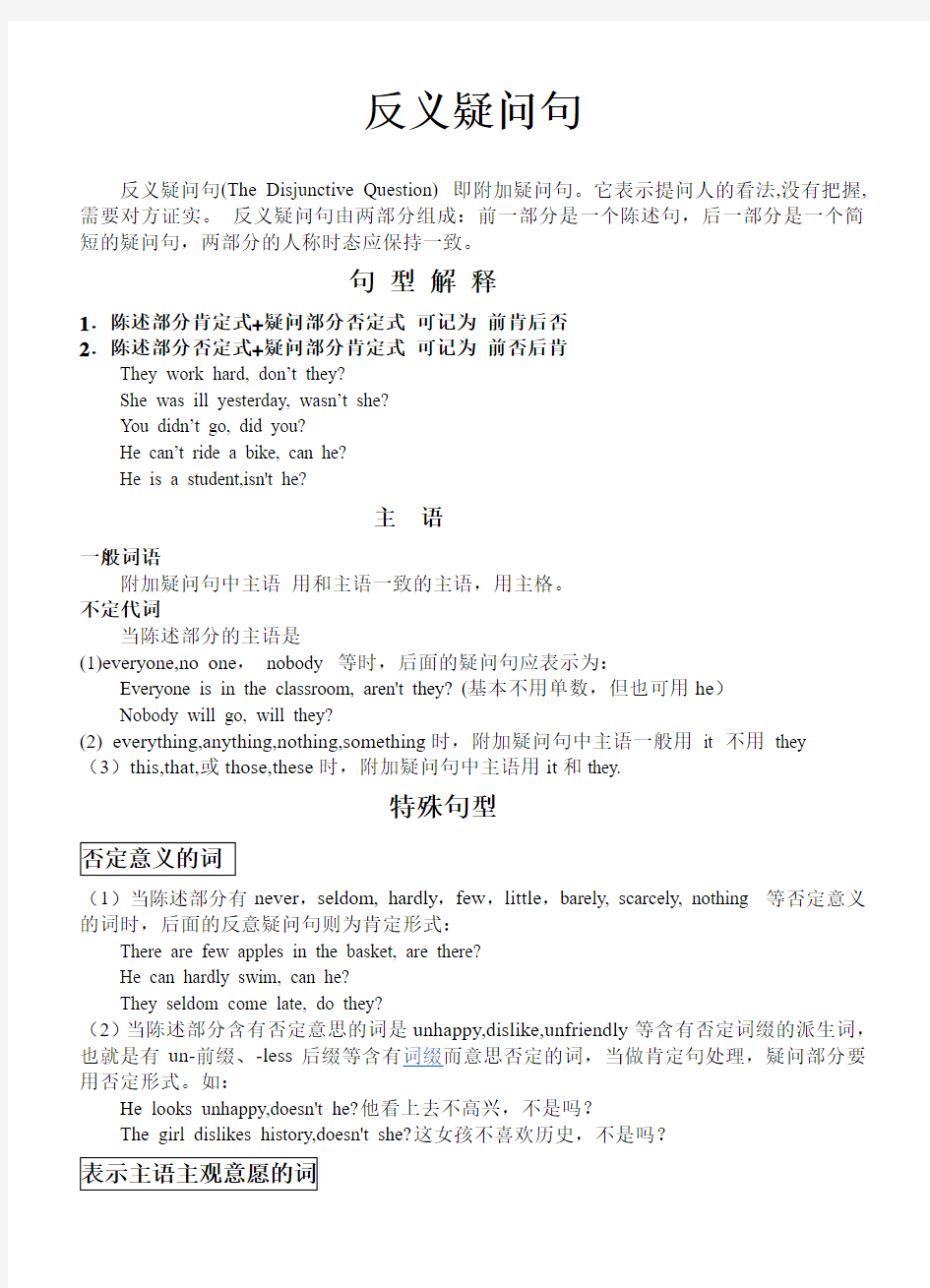
英语-反义疑问句-的-用法
- 格式:doc
- 大小:37.00 KB
- 文档页数:4


反义疑问句
反义疑问句(The Disjunctive Question) 即附加疑问句。它表示提问人的看法,没有把握,需要对方证实。反义疑问句由两部分组成:前一部分是一个陈述句,后一部分是一个简短的疑问句,两部分的人称时态应保持一致。
句型解释
1.陈述部分肯定式+疑问部分否定式可记为前肯后否
2.陈述部分否定式+疑问部分肯定式可记为前否后肯
They work hard, don’t they?
She was ill yesterday, wasn’t she?
You didn’t go, did you?
He can’t ride a bike, can he?
He is a student,isn't he?
主语
一般词语
附加疑问句中主语用和主语一致的主语,用主格。
不定代词
当陈述部分的主语是
(1)everyone,no one,nobody 等时,后面的疑问句应表示为:
Everyone is in the classroom, aren't they? (基本不用单数,但也可用he)
Nobody will go, will they?
(2) everything,anything,nothing,something时,附加疑问句中主语一般用it 不用they
(3)this,that,或those,these时,附加疑问句中主语用it和they.
特殊句型
(1)当陈述部分有never,seldom, hardly,few,little,barely, scarcely, nothing 等否定意义的词时,后面的反意疑问句则为肯定形式:
There are few apples in the basket, are there?
He can hardly swim, can he?
They seldom come late, do they?
(2)当陈述部分含有否定意思的词是unhappy,dislike,unfriendly等含有否定词缀的派生词,也就是有un-前缀、-less后缀等含有词缀而意思否定的词,当做肯定句处理,疑问部分要用否定形式。如:
He looks unhappy,doesn't he?他看上去不高兴,不是吗?
The girl dislikes history,doesn't she?这女孩不喜欢历史,不是吗?
含有think, believe, suppose, imagine, expect等动词后接宾语从句构成的主从复合句在构成反意疑问句时,视情况不同有两种不同的构成方式。
(1) 当主句的主语为第一人称时,其后的简短问句应与从句相一致。例如:
I expect our English teacher will be back this weekend, won't she/he?
We suppose you have finished the project, haven't you?
值得注意的是,当这些动词后接的宾语从句的否定转移到主句时,其仍属否定句,故其后的简短问句应用肯定式,而非否定式。例如:
I don't believe that he can translate this book, can he?
Wedon't imagine the twins have arrived, have they?
此类句子的回答同"前否后肯"型反意疑问句一样,如上述后一个句子,若双胞胎已经到了,则回答为"Yes, they have.";若尚未到达,使用"No, they haven't."。
(2) 当主句的主语为第二、三人称时,其后的简短问句则应与主句相一致(此时,否定只看主句,与从句无关...)。例如:
Your sister supposes she needs no help, doesn't she?
You thought they could have completed the project, didn't you?
They don't believe she's an engineer, do they?
She doesn't expect that we are coming so soon, does she?
(3)但如果主句的时态是过去时等等,疑问句应和主句的人称时态保持一致。
陈述部分有had better,或其中的have表示完成时态时,疑问句应用hadn’t等开头:You’d better get up early, hadn’t you?
其他情况句中有have时疑问句应用don't等开头
如have表示“有”的时候,有两种形式:
-He has two sisters,doesn't he?
-He doesn't have any sisters,does he?
当陈述部分是祈使句时,疑问句要根据语气来表达
当开头是Let‘s时,一定要用shall we。其余都用will you(包括Let us)不论肯定否定Let’s go out for a walk, shall we?
Let us go out for a walk, will you?
Let me help you,may I?
Turn on the radio, will you?
There be 句型中,反义疑问部分必须为be 动词+ there
There are some apples in the basket, aren't there?
There isn't any milk left, is there?
当陈述部分有情态动词must,问句有4种情况:
(1)mustn't表示“禁止,不可,不必”时,附加问句通常要用must.